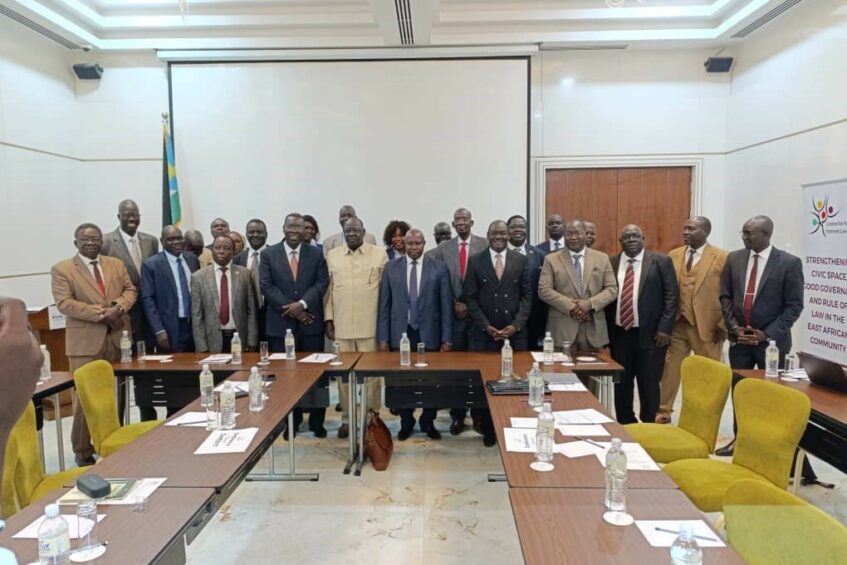
South Sudanese magistrates being trained in Juba. (Photo: Michael Daniel)
The East African Court of Justice (EACJ) has enlightened South Sudanese magistrates on the regional court’s procedures to promote good governance and the rule of law in member states.
EACJ is tasked with resolving disputes involving partner-states of the East African Community.
Its role is to ensure adherence of the community members to law in the interpretation, application, and compliance with the East African Community Treaty of 1999.
However, the court does not have the competence to hear individual complaints of alleged violations of human rights law.
According to Justice Nestor Kayobera, the President of East Africa Court of Justice, most often cases filed against member state governments were done under the article of rule of law and good governance.
Justice Kayobera also said the court only accepts cases when the national courts violate the treaty and do not adhere to their national laws.
“We are training the judiciary and legal senior counsels community law on the treaty and also in the rule of law and good governance. Most of these cases which were filed against the government were filed under the article of rule of law and good governance,” Kayobera said.
“We conducted this important training for the judiciary and government lawyers because if they didn’t make their decisions based on their internal laws or the laws of the community, then the decision will be taken to the regional court.”
“So, any case filed to the regional court has to be filed not only according to court procedure but according to the treat.”
In recent years, several South Sudanese have opted to have their legal disputes settled in the regional court in what analysts perceive as a distrust in the country’s judiciary system.
On April 12 2024, three law firms noticed the South Sudan government that they were filing a case regarding the detention of the former Juba Mayor Kalisto Lado.
In 2020, EACJ ruled against what it called unconstitutional government action to dismiss 14 judiciary members in 2017 after the judges sued the government.
Also in July 2022, some religious leaders sued the national government at the East African Court of Justice for confiscating church land.
In July 2023 South Sudan’s Member of Parliament, Juol Nhomngek, took legal action against the assembly at the EAC Court after being suspended and denied access to the house premises.
In his part, Justice Dr, Benjamin Baak Deng Director of Training and Research in South Sudan Judiciary, said the treaty gives citizens the right to litigate cases before courts that they believe provide the most fair trial.
“There issue has been raised the issues are related to the interpretation itself in terms of the rule of law and good governance there is nothing wrong with this,” Dr. Baak told Eye Radio.
“There is no problem, and then if there is an issue that falls under the treaty, it will be done by the East Africa Court of Justice. It’s not our role to say anybody who has a case or dispute should come before us.”
“Every he is free to go to any judiciaries he likes and if there is anybody who wants to question him it will be between him and that person.”
In January 2024, the National Minister of Information called for better working relations with the East African Court of Justice to enable member states to discharge their judicial powers effectively.
Michael Makuei Lueth said cases from South Sudan are being tried in the EAC tribunal without the knowledge of the country’s judiciary.
Makuei called for a special consideration of the situation, which he said undermines the powers of EAC member states in discharging their judicial duties.
The East African Court of Justice was established in November 2001 in Arusha Tanzania, to ensure the adherence to law in compliance with the EAC Treaty.
Support Eye Radio, the first independent radio broadcaster of news, information & entertainment in South Sudan.
Make a monthly or a one off contribution.
Copyright 2024. All rights reserved. Eye Radio is a product of Eye Media Limited.